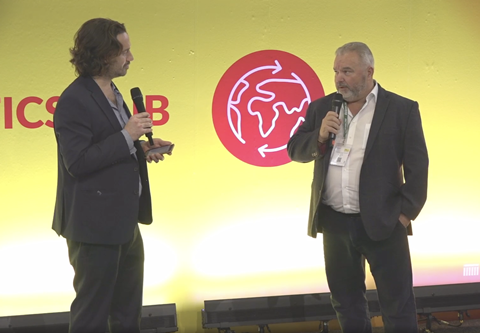This Logistics Hub session focused on the impact of new legislation on the UK business and those looking to supply it

Mike Parr, director at PML Seafrigo, discussed the post-Brexit challenges faced by those looking to ship from or supply the UK fresh produce market on the opening day of Fruit Logistica in Berlin.
During the Logistics Hub session, Parr highlighted some of his frustrations with the constant uncertainty and moving goalposts when it came to new rules and government legislation.
“We programmed for Brexit as best we could, but unfortunately the government keep kicking the can down the road and changing the rules,” explained Parr. ”So much so that for exports for Northern Ireland they actually changed the rules the day before the next set of rules were supposed to come in.
”It’s very difficult to plan and it creates concern for us and our customers,” he noted. ”We’re here to advise our customers but when the rules change every two minutes, we don’t know what to advise.”
Parr said that PML Seafrigo had set up a facility in Kent to help customers with inbound trucks and had employed around 20 import clarks, before the rules changed once more and the number of clarks had to be reduced.
The constant shifting of regulations was not just affecting businesses but individual livelihoods, he said.
Inspection delays
There were many obstacles ahead when it came to exporting to the UK given the current regulations, Parr confirmed.
”Originally the government advised us that all EU products would be classed a low-risk, but that has now changed and they have listed as fair few products as medium-risk,” he told visitors. ”These need to be inspected at the borders. In addition the originating country has to raise a phytosanitary certificate which will cause delays.
”We just don’t have enough government bodies in the UK to do the inspections,” Parr warned. ”We are trying to get them to let the trade do the inspections itself, otherwise we will have huge delays.”
The knock-on effect would also be higher costs, with additional talks of a tax on products coming through Dover to cover the Sevington Inland Border Facility – the FPC estimated this could be in excess of £200m.
“These costs are going to be passed on to those consumers doing their shopping, and we’re already talking about the high cost of living,” he said. ”The shippers are going to have to pass the costs on because they can’t keep absorbing all the time. Everybody has noticed supermarket prices going up and it’s getting very difficult out there.”
Problematic destination
The empty supermarket shelves that were seen in the UK in 2023 could become more of a norm given the new regulations and ongoing uncertainty.
“I think the UK is becoming what I would call a problematic destination,” Parr said. ”It’s getting to the stage where people don’t want to supply the UK as there is too much beurocracy, and beurocracy pushes prices up.”
Parr outlined that he had spoken with government officials on the topic of imports many times, but that often the individuals dealing with things kept changing and the process kept restarting.
Would these issues create more opportunities for domestic producers though?
”UK produce exports have actually grown, not just to the Middle East but the US, the Far East as well, and we grow good products in the UK,” Parr explained. “But again the other issue is that of labour. I know certain farms that just couldn’t pick everything that they grow because they don’t have the labour.”
Hope sprung eternal that the UK government would listen to the concerns of the industry, he said.
“We do hope that the government has a u-turn on this medium risk issue,” Parr commented. “We’re pushing hard, ourselves and the FPC. Let’s hope that they listen and we can supply the UK easily.
“Rest assured, we will keep pushing to try and ease these border checks.”



